|
|
| |
|
| |

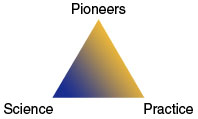
SpringerBriefs on
Pioneers in Science and Practice (PSP)
Edited by
Hans Günter Brauch
Free University of Berlin and AFES-PRESS
Overview on the five books with texts by
Carl Friedrich von Weizsäcker
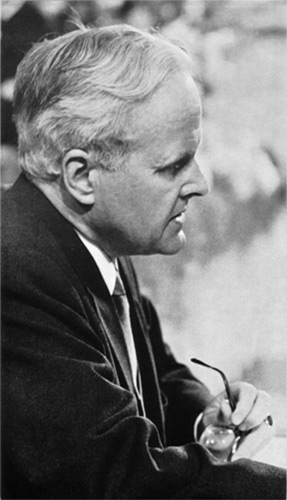
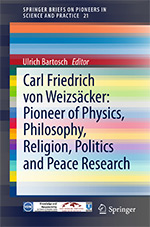 |
Ulrich Bartosch (Ed.): Carl Friedrich von Weizsäcker: Pioneer of Physics, Philosophy, Religion, Politics and Peace Research. Springer Briefs on Pioneers in Science and Practice No. 21 – presented by Ulrich Bartosch (Cham – Heidelberg – New York – Dordrecht – London: Springer, 2014).
ISBN (Print): 978-3-319-13445-1
ISBN (Online/eBook): 978-3-319-13446-8
DOI: 10.1007/978-3-319-13446-8
Order this book on the Springer Website
|
| |
|
- Selection of key texts of a major German universal scientist and thinker of the 20th century appears for the first time in English
- Essential texts by one of the most important physicists and philosophers, on physics, philosophy, religion, politics and peace research
- Texts on war and peace, peace and truth, policy implications of nuclear energy, world domestic policy, ethical issues of modern strategy, and consequences of war
This book offers a collection of texts by Carl Friedrich von Weizsaecker (1912-2007), a major German universal scientist who was a pioneer in physics, philosophy, religion, politics and peace research. He started as an assistant to the physicist, Werner Heisenberg, held professorships in theoretical physics (Strasbourg), physics (Goettingen) and philosophy (Hamburg) and was a co-director (with Juergen Habermas) of a Max Planck Institute for Research into living conditions in a world of science and technology in Starnberg. This unique anthology spans the wide scope of his innovative thinking including his philosophical self-reflections, on peace, nuclear strategy, security and defensive defense, on nuclear energy, on the conditions of freedom, on his experience of religion, including poetry from his early youth. Most texts appear in English for the first time and are selected for use in seminars on physics, philosophy, religion, politics and peace research.
Content Level » Research
Keywords » Policy Implications of Nuclear Energy and Nuclear War - Research on and Policy of Peace - Science, Energy, Security Policy and Politics - War and Peace, Peace and Truth - World Domestic Policy, Ethical Issues of Modern Strategy
Related subjects » History of Science - Physics - Political Science |
| |
|
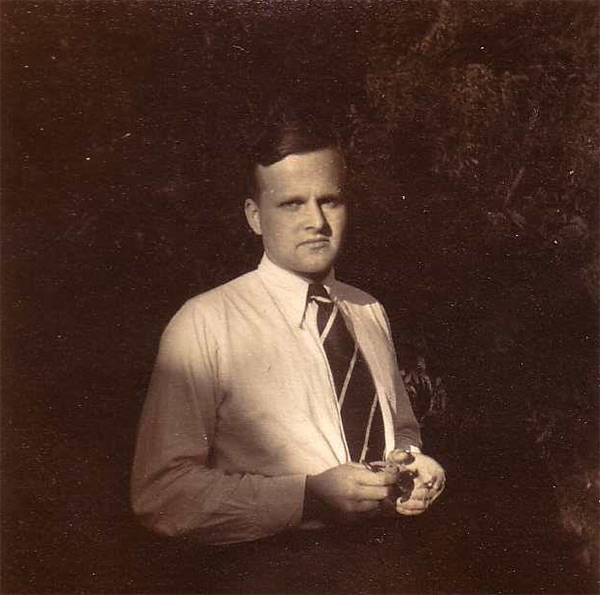
|
| |
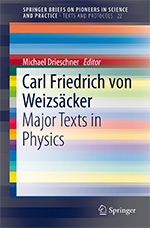 |
Michael Drieschner (Ed.): Carl Friedrich von Weizsäcker: Major Texts in Physics. Springer Briefs on Pioneers in Science and Practice, vol. 22, Subseries with Texts and Protocols, vol. 9 (Cham – Heidelberg – New York – Dordrecht – London: Springer-Verlag, 2014).
ISBN (Print): 978-3-319-03667-0
ISBN (Online/eBook): 978-3-319-03668-7
DOI: 10.1007/ 978-3-319-03668-7
Order Form
Order this book on the Springer Website
Order electronic version and individual chapters |
| |
- Texts by one of the most important physicists of the 20th century
- Selection of essential texts for use in studies of the history and epistemology of physics
- Original texts as a source of further discussions on the foundations of quantum mechanics and the structure of physics
This book presents a collection of texts by the German physicist and philosopher Carl Friedrich von Weizsäcker (1912-2007), for use in seminars on the history, epistemology and structure of physics. Weizsäcker became famous through his works in physics, mainly in the early development of nuclear physics. Later he would also become well known as a philosopher and analyst of contemporary culture. Texts include the original publications of the “Weizsäcker-Bethe formula” of nuclear masses and the “Bethe-Weizsäcker cycle,” which explains the source of energy in the sun; both were developed by Bethe at the same time and independently of Weizsäcker. Further texts deal with Weizsäcker’s explanation of the origin of planets, his explanation of the “time arrow” in Statistical Mechanics, and his analyses of Quantum Mechanics and the structure of physics in general.
Content Level » Research
Keywords » Foundations of Quantum Mechanics - Foundations of Science - German Research Papers Physics - History of Nuclear Physics
Related subjects » Astronomy - History & Philosophical Foundations of Physics - Quantum Physics
Table of contents
Introduction.- On Elementary Transmutations in the Interior of Stars. Paper II.- The Formation of the Planetary System.- The History of Nature, Introduction.- The Second Law and the Difference between Past and Future.- A Sketch of the Unity of Physics.- Quantum Theory.- Probability and Abstract Quantum Theory.- The Philosophy of Alternatives.- Matter and Consciousness.- Matter, Energy, Information
|
| |
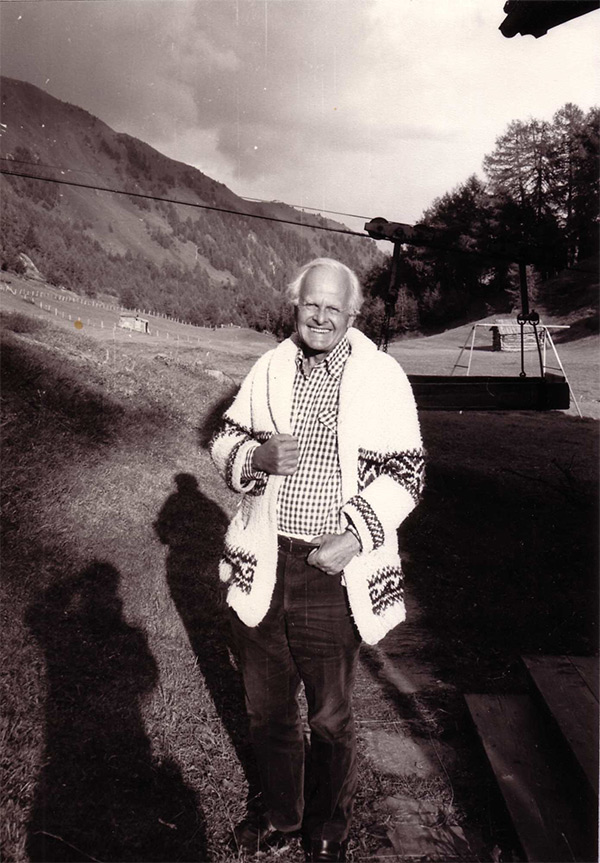 |
| |
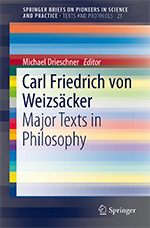 |
Michael Drieschner (Ed.): Carl Friedrich von Weizsäcker: Major Texts in Philosophy. Springer Briefs on Pioneers in Science and Practice, vol. 23, Subseries with Texts and Protocols, vol. 10 (Cham – Heidelberg – New York – Dordrecht – London: Springer-Verlag, 2014).
ISBN (Print): 978-3-319-03670-0
ISBN (Online/eBook): 978-3-319-03671-7
DOI: 10.1007/ 978-3-319-03671-7-
Order Form
Order this book on the Springer Website
Order electronic version and individual chapters |
| |
- Texts by one of the most important philosophers of the 20th century
- Selection of essential texts for use in studies of philosophy of nature, general philosophy and epistemology, ancient philosophy and epistemology of physics
- Original texts as a source of further discussions on philosophy of the 20th century
This book presents a collection of texts by the German philosopher and physicist Carl Friedrich von Weizsäcker (1912-2007), for use in seminars on philosophy, mainly epistemology and the philosophy of natures, but also for courses on German philosophy of the 20th century or the philosophy of science. Weizsäcker became famous through his works in physics, later becoming well known as a philosopher and an analyst of contemporary culture and politics. He worked intensively on projects for the prevention of nuclear war and for peace in general. – Texts about classical philosophy are included as well as on logic, on the philosophy of biology, of quantum mechanics and on the philosophy of mathematics, on emotions in foreign politics as well as on “power”.
Content Level » Research
Keywords » Epistemology of Natural Science - Foundations of Quantum Mechanics - German Philosophy of the 20th Century - Political thought of Germany in the 20th Century - Relations between Contemporary Science and Classical Philosophy
Related subjects » Epistemology & Philosophy of Science - History & Philosophical Foundations of Physics - Philosophy - Political Science
Table of contents
Introduction.- Preliminary Epistemological Considerations.- A Description of Physics.- Time – Physics – Metaphysics.- Biological Preliminaries to Logic.- Models of Health and Illness, Good and Evil, Truth and Falseness.- Parmenides and the Graylag Goose.- Parmenides and Quantum Theory.- Possibility and Movement: A Note on Aristotelian Physics.- The Rationality of Emotions.- On Power
|
| |
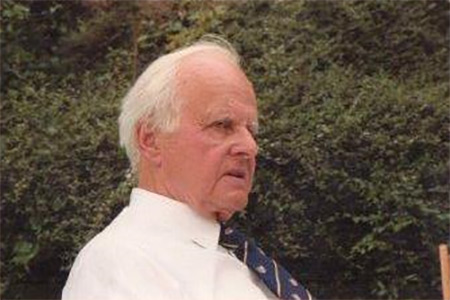 |
| |
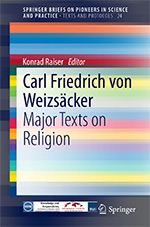 |
Konrad Raiser: Carl Friedrich von Weizsäcker: Major Texts on Religion. Springer Briefs on Pioneers in Science and Practice, vol. 24, Subseries with Texts and Protocols, vol. 11 (Cham – Heidelberg – New York – Dordrecht – London: Springer-Verlag, 2014).
ISBN (Print): 978-3-319-03703-5
ISBN (Online/eBook): 978-3-319-03704-2
DOI: 10.1007/ 978-3-319-03704-2
Order Form
Order this book on the Springer Website
Order electronic version and individual chapters |
| |
- Texts by one of the most important philosophers of the 20th century, available in English for the first time
- Selection of essential texts for use in studies of the philosophy of religion and religious evolution
- Original texts as a source of further discussions on the role of religion in the 21st century
This book presents a collection of texts by the German physicist and philosopher Carl Friedrich von Weizsäcker (1912-2007) in English, for use in seminars on the philosophy of religion, the comparative study of religion, but as well on the relationship between religion and the scientific worldview. Several of the texts appear in English for the first time. Weizsäcker became famous through his works in physics, mainly in the early development of nuclear physics. Later he would also become well known as a philosopher and analyst of contemporary culture. He also worked very intensely on projects for the prevention of nuclear war and for peace in general.
Content Level » Research
Keywords » Interreligious Understanding - Meditation and Religious Experience - Religion and the Future of Humanity - What is Religion?
Related subjects » History of Science - Religious Studies
Table of contents
|
| |
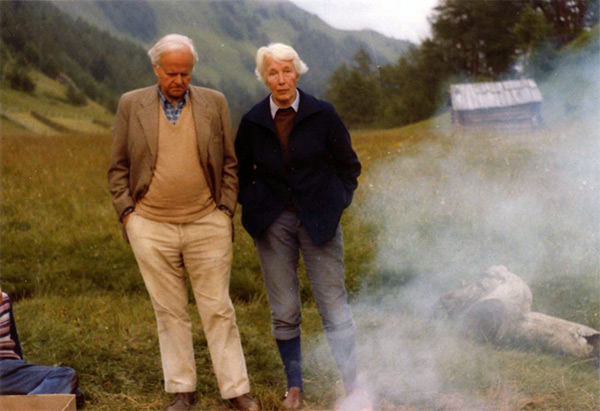 |
| |
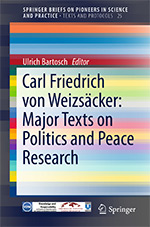 |
Ulrich Bartosch: Carl Friedrich von Weizsäcker: Major Texts on Politics and Peace Research. Springer Briefs on Pioneers in Science and Practice, vol. 25, Subseries with Texts and Protocols, vol. 12 (Cham – Heidelberg – New York – Dordrecht – London: Springer-Verlag, 2015).
ISBN (Print): 978-3-319-13307-2
ISBN (Online/eBook): 978-3-642
DOI: 10.1007/978-3-319-13308-9
Order Form
Order this book on the Springer Website
Order electronic version and individual chapters |
| |
- Selection of key texts of a major German universal scientist and thinker of the 20th century appears for the first time in English
- Essential texts by one of the most important physicists and philosophers, on physics, philosophy, religion, politics and peace research
- Texts on war and peace, peace and truth, policy implications of nuclear energy, world domestic policy, ethical issues of modern strategy, and consequences of war
This book offers a collection of texts by Carl Friedrich von Weizsaecker (1912-2007), a major German universal scientist who was also a pioneer in physics, philosophy, religion on issues of politics and peace research. He worked with Werner Heisenberg and Otto Hahn in the German “Uranverein”, obtained a patent for plutonium during World War II and was an opponent of the nuclear armament of the German armed forces (1957). Furthermore, he published a study on the inability to defend Germany (1971) that was instrumental in the debate on defensive defense since the mid 1970s. He wrote on war and peace, peace and truth, policy implications of nuclear energy, on ethical issues of modern strategy, on consequences of war and war prevention and on the theory of power. He coined the term “world domestic policy” which still covers a valid theory for political, institutional secured world peace in the atomic age.
Content Level » Research
Keywords » Policy Implications of Nuclear Energy and Nuclear War - Research on and Policy of Peace - Science, Energy, Security Policy and Politics - War and Peace, Peace and Truth - World Domestic Policy, Ethical Issues of Modern Strategy
Related subjects » Particle and Nuclear Physics - Political Science
|
| |
On Prof. Dr. Carl Friedrich von Weizsäcker |
| |
Biographies on Carl Friedrich von Weizsäcker:
- Thomas Görnitz: Carl Friedrich von Weizsäcker (Freiburg: Herder Spektrum, 1992).
- Michael Drieschner: Carl Friedrich von Weizsäcker zur Einführung (Hamburg: Panorama, 1992).
- Dieter Hattrup: Carl Friedrich von Weizsäcker (Darmstadt: Primus, 2004).
- Michael Drieschner: “OBITUARY: Carl Friedrich von Weizsäcker”, in: Journal for General Philosophy of Science 39 (2008), p. 1–16.
|
| |
Biography |
| |
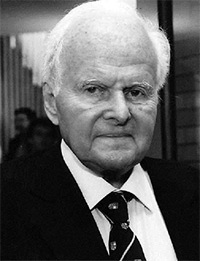
This photograph was provided
by
the Max-Planck-Gesellschaft/
Filser
which granted permission
for its use. |
Carl Friedrich Freiherr von Weizsäcker (June 28, 1912 – April 28, 2007) was a German physicist and philosopher. A member of the prominent Weizsäcker family, he was son of the diplomat Ernst von Weizsäcker, elder brother of the former German President Richard von Weizsäcker, father of the physicist and environmental researcher Ernst Ulrich von Weizsäcker, and father-in-law of the former General Secretary of the World Council of Churches Konrad Raiser. Born in Kiel, he was raised in Stuttgart, Basel, and Copenhagen. From 1929 to 1933, Weizsäcker studied physics, mathematics and astronomy in Berlin, Göttingen and Leipzig supervised by and in cooperation with Werner Heisenberg and Niels Bohr, among others. The supervisor of his doctoral thesis was Friedrich Hund.
Weizsäcker made important discoveries in theoretical physics regarding the masses of atomic nuclei, energy production in stars from nuclear fusion processes, and on planetary formation in the early Solar System. During World War II he participated in the German program for developing nuclear energy and atomic bombs. In his later career, he focused on philosophical and ethical issues, and was awarded several international honours for his work in these areas. |
| |
Work on nuclear physics: Weizsäcker's special interest as a young researcher was the physics of the atomic nucleus. Simultaneously with Hans Bethe he found a mechanism or pathway for the cyclic process of fusion in stars (Bethe-Weizsäcker process, published 1937-1939). This discovery should not be confused with his 1935 development of the Bethe-Weizsäcker formula, or Semi-Empirical Mass Formula (SEMF) for nuclear masses, again simultaneously with Hans Bethe.
Work on planetary formation: In 1938, Weizsäcker developed a theory of the formation of the Solar System, based mainly on considerations of turbulent motion of gases and dust. The theory also helped to explain the empirically observed regular pattern of increase in the diameters of the orbits of the planets of the Solar System, from inward to outward.
Work on atomic weapons: As a theoretical physicist, Weizsäcker (and by his own estimate, 200 other physicists) had recognized immediately after nuclear fission had become known (by Otto Hahn) in 1938 that nuclear weapons could potentially be built. He discussed the upsetting implications in February 1938 with philosopher friend Georg Picht.
During World War II, Weizsäcker joined the German nuclear energy project, participating in efforts to construct an atomic bomb. For some time he had been hoping for political influence growing out of participation in a successful nuclear weapons project. In July 1940 he was co-author of a report to the Army on the possibility of "energy production" from refined uranium. The report also predicted the possibility of using plutonium for the same purpose including the production of a new type of explosives. During summer 1942 Weizsäcker drafted a patent on a transportable "process to generate energy and neutrons by an explosion ... e.g., a bomb", which was never filed. The draft was found in the 1990s in Moscow.
Historians have been divided as to whether Heisenberg and his team were sincerely trying to construct a nuclear weapon. In a 1957 interview with the German weekly Der Spiegel, Weizsäcker frankly admitted to the scientific ambitions of those years: "We wanted to know if chain reactions were possible. No matter what we would end up doing with our knowledge—we wanted to know." Weizsäcker said that they were spared the decision on building the bomb as they saw rather soon that the German war economy was unable to mobilize the necessary resources.
Weizsäcker worked later during the war as a professor in Strasbourg. The American capture of his laboratory and papers there in December 1944 revealed to the Western Allies that the Germans had not come close to developing a nuclear weapon.
Post-war career: In 1946, Weizsäcker became director of the department for theoretical physics in the Max Planck Institute for Physics in Göttingen. Weizsäcker felt that the scientists who had developed the foundations of such powerful theories as that of the atomic nucleus, should take on the responsibility for the consequences. In 1957, it was mainly he who formulated the protest of the ‘Göttinger 18’, a group of prominent German physicists, against the idea that the West German armed forces should be equipped with tactical nuclear weapons. He suggested that West Germany should declare its definitive abdication of all kinds of nuclear weapons. From 1957 to 1969, Weizsäcker was professor of philosophy at the University of Hamburg. From 1970 to 1980, he was head of the Max Planck Institute for the Research on Living Conditions in the Modern World in Starnberg. He researched and published mainly on philosophy and foundations of physics, but also on the danger of nuclear war, which he thought underestimated by the public and the political establishment, on the conflict between the First World and the Third World, and the consequences of environmental degradation, and on the world as an interlocking whole (‘Weltinnenpolitik’). In the 1970s he founded, together with the Indian philosopher Pandit Gopi Krishna, a research foundation “for western sciences and eastern wisdom”.
After his retirement in 1980 he intensified his work on the conceptual foundations of physics and on philosophical issues. In the 1980s he invested much of his creative energy in the promotion of what was originally called a “Council for Peace”. The movement resulted in the “World Convocation on Justice, Peace and the Integrity of Creation” in Seoul in 1990.
Weizsäcker developed the theory of ur-alternatives (archetypal objects), publicized first in his book Die Einheit der Natur (1971; English translation “The Unity of Nature”, 1980) and further developed through the 1990s. The theory axiomatically constructs quantum physics and uses it to discuss the foundation of a universal physics on the quantum mechanics of binary alternatives. Weizsäcker used his theory, a form of digital physics, to derive the 3-dimensionality of space. The program has not, so far, come to an end. In 2007, Weizsäcker died at the age of 94 in Starnberg, Germany.
Awards and honours: Max Planck Medal (1957), Goethe Prize of the city of Frankfurt am Main (1958), Pour le Mérite for Science and Art (1961), Peace Prize of the German Book Trade (1963), Erasmus Prize of the city of Herdam (1969), Austrian Medal for Science and Art (1969), Grand Merit Cross with Star and Sash of the Federal Republic of Germany (1973) Ernst Hellmut Vits Prize of the University of Münster (1982), Heinrich Heine Prize of the city of Düsseldorf (1983), Sigmund Freud Prize for Scientific Prose (1988), Templeton Prize for “Progress in Religion” (1989), Theodor Heuss Prize “for his world-renowned, diverse and dedicated contributions to humanity themes: peace – justice – Integrity of Creation” (1989), Prix Arnold Reymond (University of Lausanne), Hanseatic Goethe Prize, Karl IV Prize of the City and University of Prague.
Honorary degrees: Law: Free University of Amsterdam, University of Alberta, University of Aberdeen; Theology: University of Tübingen, University of Basel; Science: Karl Marx University, Leipzig; Philosophy: Berlin Institute of Technology, University of Aachen
Memberships: Max Planck Society for the Advancement of Sciences, German Academy of Sciences Leopoldina, Göttingen Academy of Sciences, Saxon Academy of Sciences, Austrian Academy of Sciences, Bavarian Academy of Sciences, Bavarian Academy of Fine Arts, German Physical Society, Académie des Sciences Morales et Politiques, American Physical Society, Croatian Academy of Sciences and Arts, German Academy for Language and Literature, Joachim-Jungius Society of Science /Hamburg Academy of Sciences, Hamburg Institute for Human Sciences
Among his major publications are: Zum Weltbild der Physik (Leipzig 1946, 2002, 14th edition, renewed and with introduction by Holger Lyre) [The World View of Physics (London, 1952)]; Le Monde vu par la Physique (Paris 1956); Der begriffliche Aufbau der theoretischen Physik (Lecture Notes 1946) (Stuttgart 2004); Die Geschichte der Natur (Göttingen 1948) [History of Nature (London 1951)]; The Relevance of Science (London - New York 1964); [Die Tragweite der Wissenschaft (Stuttgart 1990); Die Einheit der Natur (Munich 1971) [The Unity of Nature (New York 1980); The Biological Basis of Religion and Genius, Gopi Krishna (New York 1971), intro. by Carl Friedrich von Weizsäcker, which is half the book; Wege in der Gefahr (Munich 1976); The Politics of Peril (New York 1978); Der Garten des Menschlichen (Munich 1977) [The Ambivalence of progress, essays on historical anthropology (New York 1988)]; Deutlichkeit: Beiträge zu politischen und religiösen Gegenwartsfragen (Munich 1978); Der bedrohte Friede (Munich 1981); Wahrnehmung der Neuzeit (Munich 1983); Aufbau der Physik (Munich 1985) [The Structure of Physics (Heidelberg 2006)]; Die Zeit drängt (Munich 1986); Bewusstseinswandel (Munich 1988); Der Mensch in seiner Geschichte (Munich 1991); Zeit und Wissen (Munich 1992); Große Physiker (Munich 1999).
These books of C. F. von Weizsäcker were published in English: The history of nature, translated by Fred D. Wieck (Chicago: University of Chicago Press, 1949, 1966) translation of: Die Geschichte der Natur (Göttingen, 1948); The world view of physics, translated by Marjorie Grene (London: Routledge and K. Paul, 1952), translation of: Zum Weltbild der Physik (Leipzig 1946, 2002); C.F. von Weizsäcker and J. Juilfs: The rise of modern physics, translated by Arnold J. Pomerans (New York: G. Braziller, 1957), translation of: Physik der Gegenwart; C.F. von Weizsäcker and J. Juilfs, also published as: Contemporary physics, Translated by Arnold J. Pomerans (London: Hutchinson’s Scientific & Technical Publications, 1957); Ethical and political problems of the atomic age (London: SCM press; Burge memorial lecture, 1958); The relevance of science; creation and cosmogony (London: Collins, 1964); The spectrum of turbulence with large Reynolds numbers, translated by Barbara Dickinson (Farnborough: Ministry of Technology, 1966); L. Castell, M. Drieschner, C. F. von Weizsäcker (Eds.): Quantum theory and the structures of time and space, I–VI (Munich: Hanser, 1974–1986); Cooperation of Western nations in a coming world crisis (Palo Alto, CA: Aspen Institute for Humanistic Studies, 1977); The politics of peril: economics, society, and the prevention of war, translated by Michael Shaw (New York: Seabury Press, 1978). Translation of: Wege in der Gefahr (Munich: Hanser, 1976); The unity of nature, translated by Francis J. Zucker. (New York: Farrar Straus Giroux, 1980), translation of: Einheit der Natur; The ambivalence of progress: essays on historical anthropology (New York: Paragon House, 1988). Translation of: Der Garten des Menschlichen (Munich: Hanser, 1977); Plaass, Peter: Kant’s theory of natural science; translation, analytic introduction, and commentary by Alfred E. and Maria G. Miller; with an introductory essay by Carl Friedrich von Weizsäcker. (Dordrecht – Boston: Kluwer Academic, 1994); revised and enlarged by Thomas Görnitz and Holger Lyre (eds.): The structure of physics (Dordrecht: Springer, 2006), based on: Aufbau der Physik (Munich: Hanser 1985). And the five volumes in this series of Springer Briefs on Pioneers in Science and Practice (Cham - Heidelberg – New York - Dordrecht – London: Springer, 2014, 2015): Ulrich Bartosch (ed.): Carl Friedrich von Weizsäcker: Pioneer of Physics, Philosophy, Religion, Politics and Peace Research (PSP 21); Michael Drieschner (ed.): Carl Friedrich von Weizsäcker: Major Texts in Physics (PSP-22); Michael Drieschner (ed.): Carl Friedrich von Weizsäcker: Major Texts in Philosophy (PSP-23); Konrad Raiser (ed.): Carl Friedrich von Weizsäcker: Major Texts on Religion (PSP-24). Ulrich Bartosch (ed.): Carl Friedrich von Weizsäcker: Major Texts on Politics and Peace Research (PSP 25).
The photograph on this page © Max-Planck-Gesellschaft/Filser who granted permission for its use in these volumes and for this website. |
| |
Videos with Carl Friedrich von Weizsäcker
|
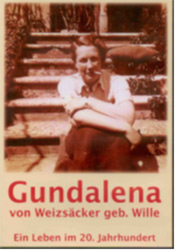 |
Gundalena von Weizsäcker: Ein Leben im 20. Jahrhundert. Ein Film von Elisabeth Raiser und Barbara Robra ( 2012). Dieser Film ist gegen eine Aufwandsentschädigung von €20 erhältlich bei Elisabeth Raiser, e-mail: <elisabeth.raiser@arcor.de>. [A Life in the 20th Century. A film by Elisabeth Raiser and Barbara Robra]. This film which is in German may be ordered for a fee of 20€ from Elisabeth Raiser,
e-mail: <elisabeth.raiser@arcor.de> |
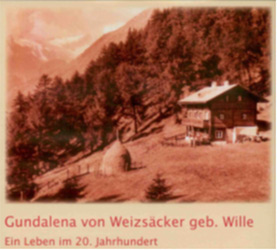 |
Gundalena von Weizsäcker was born in Switzerland and lived through the 20th century as the wife of Carl Friedrich von Weizsäcker, as a politically very attentive wife. This film portrays her family, preferences, her strengths from the perspective of her children, grandchildren, relatives and friends. This film is thus a portrait of an influential German family during the past century. |
| |
Videos and Podcasts on Carl Friedrich von Weizsäcker |
| |
| |
German Films on Carl Friedrich von Weizsäcker |
- Wege aus der Gefahr. Carl Friedrich von Weizsäcker. Film von Ebbo Demant. Deutschland (SWF). 1976.
- 1976: Klaus Peter Dencker im Gespräch mit Carl Friedrich von Weizsäcker. Eine Produktion des Saarländischen Rundfunks/Fernsehen (15 Minuten).
- In dem Fernsehfilm Ende der Unschuld wird die Figur des CF v. Weizsäcker durch Götz Schubert dargestellt.
|
| |
| |
|
|
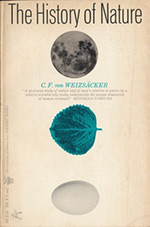 |
The history of nature,
translated by Fred D. Wieck
(Chicago: University of Chicago Press, 1949, 1966)
translation of:
Die Geschichte der Natur (Göttingen, 1948). |
|
The world view of physics,
translated by Marjorie Grene
(London: Routledge and K. Paul, 1952),
translation of:
Zum Weltbild der Physik (Leipzig 1946, 2002). |
| |
|
|
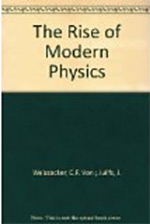 |
C.F. von Weizsäcker and J. Juilfs:
The rise of modern physics,
translated by Arnold J. Pomerans
(New York: G. Braziller, 1957),
translation of:
C.F. von Weizsäcker and J. Juilfs: Physik der Gegenwart. |
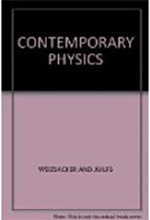 |
also published as:
Contemporary physics,
translated by Arnold J. Pomerans
(London: Hutchinson’s Scientific & Technical Publications, 1957) |
| |
|
|
| |
Ethical and political problems of the atomic age
(London: SCM press;
Burge memorial lecture, 1958). |
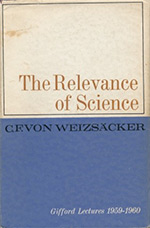 |
The relevance of science; creation and cosmogony
(London: Collins, 1964). |
| |
|
|
| |
The spectrum of turbulence with large Reynolds numbers,
translated by Barbara Dickinson
(Farnborough: Ministry of Technology, 1966). |
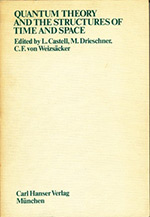 |
L. Castell, M. Drieschner, C. F. von Weizsäcker (Eds.):
Quantum theory and the structures of time and space, I–VI
(Munich: Hanser, 1974–1986). |
| |
|
|
| |
Cooperation of Western nations
in a coming world crisis
(Palo Alto, CA: Aspen Institute for Humanistic Studies, 1977). |
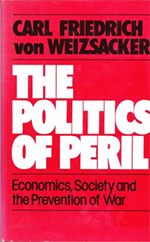 |
The politics of peril:
economics, society, and the prevention of war,
translated by Michael Shaw
(New York: Seabury Press, 1978).
Translation of:
Wege in der Gefahr (Munich: Hanser, 1976). |
| |
|
|
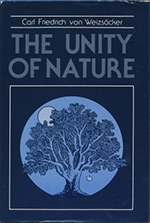 |
The unity of nature,
translated by Francis J. Zucker
(New York: Farrar Straus Giroux, 1980),
translation of: Einheit der Natur. |
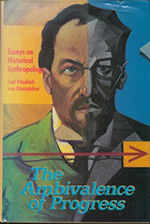 |
The ambivalence of progress:
essays on historical anthropology
(New York: Paragon House, 1988).
Translation of: Der Garten des Menschlichen
(Munich: Hanser, 1977). |
| |
|
|
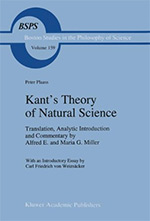 |
Plaass, Peter: Kant’s theory of natural science;
translation, analytic introduction, and commentary
by Alfred E. and Maria G. Miller;
with an introductory essay by Carl Friedrich von Weizsäcker
(Dordrecht – Boston: Kluwer Academic, 1994). |
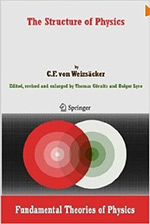 |
The structure of physics.
Revised and enlarged by Thomas Görnitz and Holger Lyre (eds.):
(Dordrecht: Springer, 2006),
based on:
Aufbau der Physik (Munich: Hanser 1985). |
| |
|
|
| |
|
|
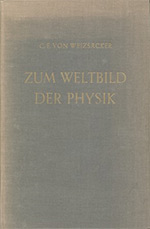 |
Zum Weltbild der Physik
(Leipzig/ Stuttgart: Hirzel, 1943),
14th ext. ed. (Stuttgart, Leipzig: Hirzel, 2002). |
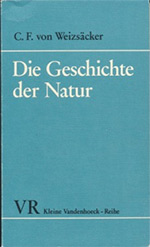 |
Die Geschichte der Natur. Zwölf Vorlesungen
(Leipzig/ Stuttgart/ Zürich: Hirzel, 1948);
new ed. (Stuttgart: Hirzel, 2006);
8th ed. (Göttingen: Vandenhoeck & Ruprecht, 1979). |
| |
|
|
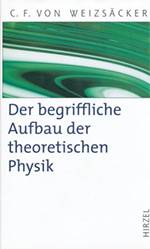 |
Der begriffliche Aufbau der theoretischen Physik.
Vorlesung vom Sommersemester 1948
(Göttingen, Typoskript, 1948);
new ed. (Stuttgart: Hirzel, 2004). |
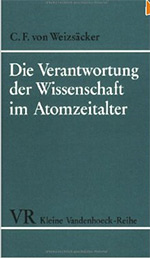 |
Die Verantwortung der Wissenschaft im Atomzeitalter.
Zwei Vorlesungen
(gehalten in Bonn 1957 bzw. Göttingen 1956/1957),
(Göttingen: Vandenhoeck & Ruprecht, 1957). |
| |
|
|
 |
Mit der Bombe leben.
Die gegenwärtigen Aussichten einer Begrenzung
der Gefahr eines Atomkrieges
(Hamburg: DIE ZEIT, 1958). |
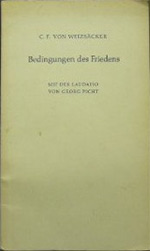 |
Die Bedingungen des Friedens.
Rede anlässlich der Verleihung des Friedenspreises
des Deutschen Buchhandels,
mit der Laudatio von Georg Picht.
(Göttingen: Vandenhoeck & Ruprecht, 1963). |
| |
|
|
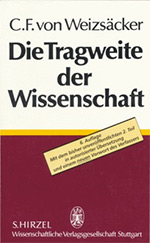 |
Die Tragweite der Wissenschaft.
Erster Band: Schöpfung und Weltentstehung.
Die Geschichte zweier Begriffe
(Stuttgart : Hirzel,1964);
ext. new ed. 1990 (7th ed., 2006). |
 |
(Ed.): Kriegsfolgen und Kriegsverhütung
(München: Hanser, 1970). |
| |
|
|
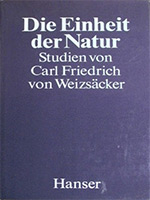 |
Die Einheit der Natur. Studien
(München: Hanser,1971);
as paperback: (München: dtv,1974). |
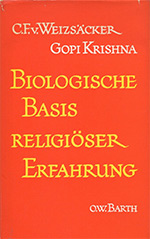 |
Biologische Basis religiöser Erfahrung
(with Gopi Krishna)
(Weilheim Otto Wilhelm Barth, 1971). |
| |
|
|
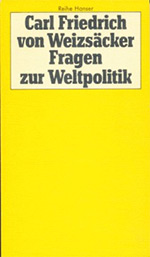 |
Fragen zur Weltpolitik
(München: Hanser,1975). |
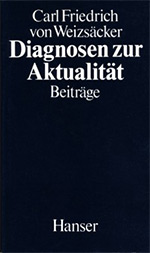 |
Diagnosen zur Aktualität. Beiträge
(München: Hanser,1979). |
| |
|
|
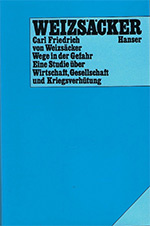 |
Wege in der Gefahr.
Eine Studie über Wirtschaft, Gesellschaft
und Kriegsverhütung
(München: Hanser, 1976);
as paperback: (München: dtv, 1979). |
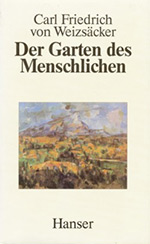 |
Der Garten des Menschlichen.
Beiträge zur geschichtlichen Anthropologie
(München: Hanser,1977);
as paperback: (Frankfurt a. M.: Fischer, 1980). |
| |
|
|
 |
Deutlichkeit: Beiträge zu politischen und
religiösen Gegenwartsfragen
(München: Hanser, 1978, 1979). |
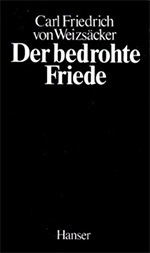 |
Der bedrohte Friede.
Politische Aufsätze 1945–1981
(München: Hanser, 1981);
as paperback: (München dtv, 1983). |
| |
|
|
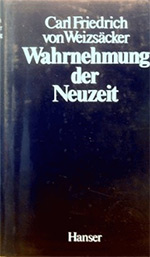 |
Wahrnehmung der Neuzeit
(München: Hanser, 1983). |
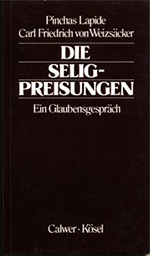 |
Die Seligpreisungen. Ein Glaubensgespräch
(with Pinchas Lapide)
(Calwer, 1985);
as paperback: (München: dtv,1985). |
| |
|
|
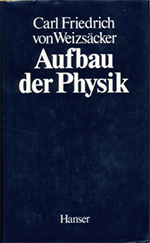 |
Aufbau der Physik
(München: Hanser, 1985);
as paperback: (München: dtv, 1988). |
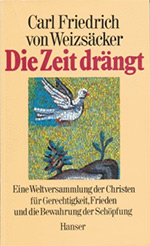 |
Die Zeit drängt.
Das Ende der Geduld
(München: Hanser, 1986). |
| |
|
|
 |
Bewußtseinswandel
(München: Hanser, 1988);
as paperback: (München: dtv, 1991). |
 |
Bedingungen der Freiheit.
Reden und Aufsätze 1989–1990
(München: Hanser, 1990). |
| |
|
|
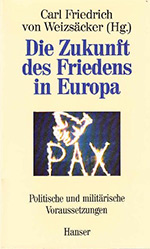 |
(Ed.): Die Zukunft des Friedens in Europa.
Politische und militärische Voraussetzungen
(München: Hanser,1990). |
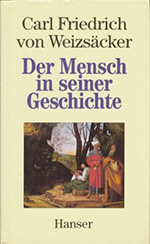 |
Der Mensch in seiner Geschichte
(München: Hanser,1991);
as paperback (München: dtv, 1993). |
| |
|
|
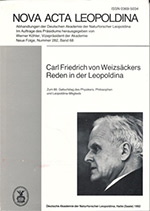 |
Reden in der Leopoldina.
Halle (Saale): Deutsche Akademie der
Naturforscher Leopoldina 1992 |
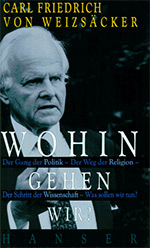 |
Wohin gehen wir? Der Gang der Politik -
Der Weg der Religion - Der Schritt der Wissenschaft -
Was sollen wir tun?
(München: Hanser, 1997). |
| |
|
|
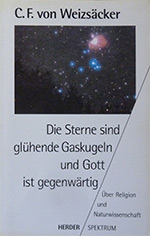 |
Die Sterne sind Gaskugeln und Gott ist gegenwärtig
(Freiburg: Herder - Spektrum, 1992). |
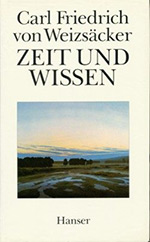 |
Zeit und Wissen
(München: Hanser, 1992);
as paperback: (München: dtv, 1995). |
| |
|
|
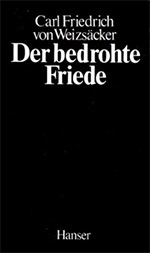 |
Der bedrohte Friede – heute
(München: Hanser,1994). |
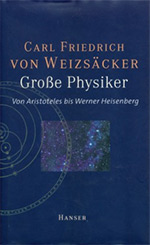 |
Große Physiker.
Von Aristoteles bis Werner Heisenberg
(München: Hanser, 1999);
as paperback: (München: dtv, 2002). |
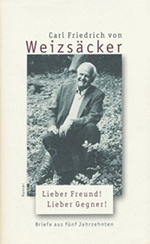 |
Lieber Freund! Lieber Gegner!
Briefe aus fünf Jahrzehnten
(München: Hanser, 2002). |
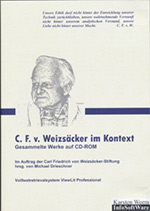 |
C. F. v. Weizsäcker im Kontext.
Gesammelte Werke auf CD-ROM,
ed. by. Michael Drieschner
(Berlin: Worm, 2011). |
| |
|
|
 |
Was wird aus dem Menschen?
(Zürich, Verlag der Arche, 1972). |
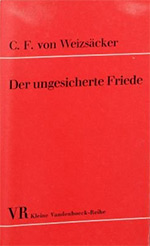 |
Der ungesicherte Friede
(Göttingen: Vandenhoeck & Ruprecht, 1969). |
| |
|
|
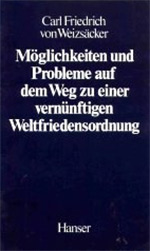 |
|
|
Möglichkeiten und Probleme auf dem Weg
zu einer vernünftigen Weltfriedensordnung
(München: Hanser, 1982). |
| |
|
|
| |
Books Co-authored, edited and co-edited
by Carl Friedrich von Weizsäcker |
|
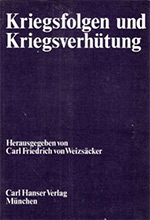 |
(Ed.): Kriegsfolgen und Kriegsverhütung
(München: Hanser, 1971) |
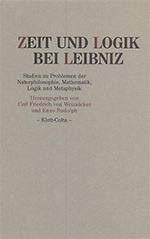 |
(Coed. with Enno Rudolph):
Zeit und Logik bei Leibniz.
Studien zu Problemen der Naturphilosophie,
Mathematik, Logik und Metaphysik
(Stuttgart: Klett-Cotta, 1989). |
| |
|
|
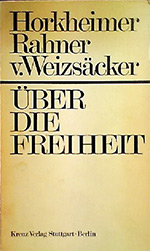 |
Über die Freiheit.
Max Horkheimer: Bedrohungen der Freiheit.
Karl Rahner: Ursprünge der Freiheit.
Carl Friedrich von Weizsäcker: Zumutungen der Freiheit
(Berlin: Kreuz Verlag, 1965). |
 |
Bedingungen des Friedens.
Carl Friedrich von Weizsäcker.
Mit d. Laudatio von Georg Picht
anlässlich der Verleihung des
Friedenspreises des deutschen Buchhandels 1963
(Göttingen: Vandenhoeck & Ruprecht, 1964). |
| |
|
|
| |
Books by Carl Friedrich von Weizsäcker
in other languages |
|
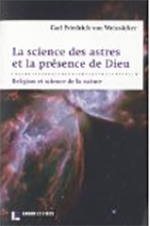 |
La science des astres et la présence de Dieu
(city : Labor Et Fides (June 9, 2012)). |
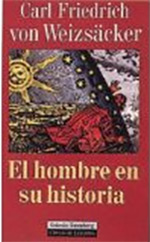 |
El Hombre En Su Historia
(city : Galaxia Gutenberg, August 2000) |
| |
|
|
| |
Books on Carl Friedrich von Weizsäcker |
|
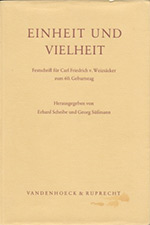 |
Erhard Scheibe, Georg Süßmann (Ed.):
Einheit und Vielheit.
Festschrift für
Carl Friedrich von Weizsäcker zum 60. Geburtstag
(Göttingen: Vandehoeck & Ruprecht, 1973). |
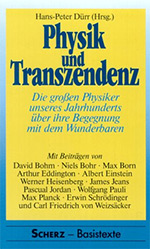 |
Hans-Peter Dürr (Ed.):
Physik und Transzendenz:
Die großen Physiker unserer Zeit über
ihre
Begegnung mit dem Wunderbaren
(Berlin: Scherz, 1986). |
| |
|
|
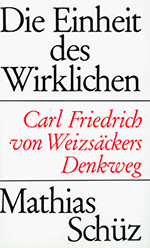 |
Mathias Schüz:
Die Einheit des Wirklichen.
Carl Friedrich von Weizsäckers Denkweg
(Pfullingen: Neske, 1986). |
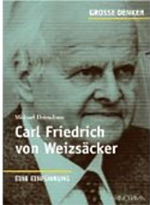 |
Michael Drieschner:
Carl Friedrich von Weizsaecker
Eine Einführung. Grosse Denker
(Hamburg: Junius 1992;
Wiesbaden: Panorama, 2005). |
| |
|
|
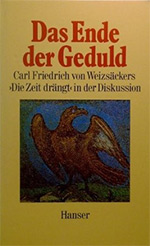 |
Günter Altner et al.:
Das Ende der Geduld:
Carl Friedrich von Weizsäckers
'Die Zeit drängt’ in der Diskussion
(München: Hanser,1987). |
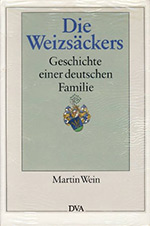 |
Martin Wein:
Die Weizsäckers.
Geschichte einer deutschen Familie
(Stuttgart: DVA, 1988). |
| |
|
|
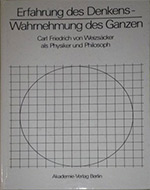 |
Peter Ackermann, Wolfgang Eisenberg, Helge Herwig (Eds.):
Erfahrung des Denkens – Wahrnehmung des Ganzen.
Carl Friedrich von Weizsäcker als Physiker und Philosoph
(Berlin. Akademie-Verlag, 1989). |
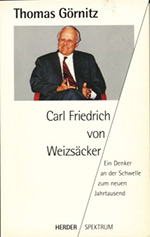 |
Thomas Görnitz:
Carl Friedrich von Weizsäcker.
Ein Denker an der Schwelle zum neuen Jahrtausend
(Freiburg: Herder 1992). |
| |
|
|
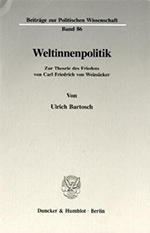 |
Ulrich Bartosch:
Weltinnenpolitik. Zur Theorie des Friedens
von Carl Friedrich von Weizsäcker
(Berlin: Duncker & Humblot, 1995). |
 |
Wolfgang Krohn, Klaus Michael Meyer-Abich (Eds.):
Einheit der Natur – Entwurf der Geschichte.
Begegnungen mit Carl Friedrich von Weizsäcker
(München. Hanser, 1997). |
| |
|
|
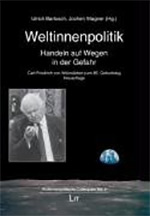 |
Ulrich Bartosch, Jochen Wagner (Eds.):
Weltinnenpolitik. Internationale Tagung
anlässlich des
85. Geburtstags von Carl-Friedrich von Weizsäcker
in der Evangelischen Akademie Tutzing
(Berlin: LIT, 1997). |
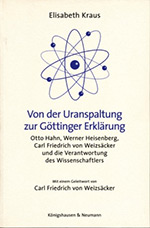 |
Elisabeth Kraus:
Von der Uranspaltung zur Göttinger Erklärung.
Otto Hahn, Werner Heisenberg, Carl Friedrich von Weizsäcker
und
die Verantwortung des Wissenschaftlers
(Würzburg: Königshausen und Neumann, 2001). |
| |
|
|
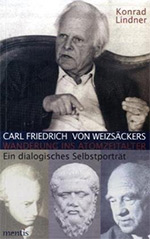 |
Konrad Lindner:
Carl Friedrich von Weizsäckers Wanderung ins Atomzeitalter.
Ein dialogisches Selbstporträt
(Paderborn: mentis Verlag, 2002). |
 |
Dieter Hattrup:
Carl Friedrich von Weizsäcker:
Physiker und Philosoph
(Darmstadt: Primus, 2004). |
| |
|
|
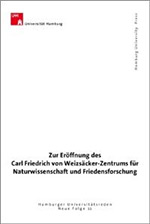 |
Martin B. Kalinowski, Hartwig Spitzer (Eds.):
Zur Eröffnung des Carl Friedrich von Weizsäcker-Zentrums
für Naturwissenschaft und Friedensforschung
(Hamburg: Hamburg University Press, 2007). |
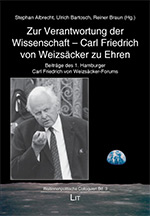 |
Stephan Albrecht et al. (Eds.):
Zur Verantwortung der Wissenschaft –
Carl Friedrich von Weizsäcker zu Ehren:
Beiträge des 1. Hamburger Carl-Friedrich-von-Weizsäcker-Forums
(Berlin/ Münster: LIT, 2008). |
| |
|
|
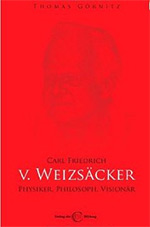 |
Thomas Görnitz:
Carl Friedrich von Weizsäcker –
Physiker, Philosoph, Visionär
(Enger: Verlag der Carl-Friedrich-von-Weizsäcker-Stiftung 2012). |
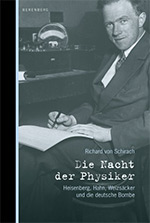 |
Richard von Schirach:
Die Nacht der Physiker.
Heisenberg, Hahn, Weizsäcker und die deutsche Bombe
(Berlin: Berenberg, 2012). |
| |
|
|
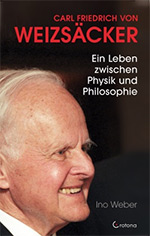 |
Ino Weber:
Carl Friedrich von Weizsäcker:
Ein Leben zwischen Physik und Philosophie
(Amerang: Crotona, 2012). |
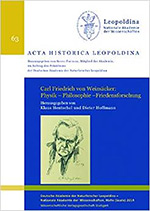 |
Klaus Hentschel and Dieter Hoffmann (Eds.)
Carl Friedrich von Weizsäcker:
Physik - Philosophie - Friedensforschung
(Stuttgart: Wissenschaftliche Verlagsgesellschaft, 2014) |
| |
|
|
On the Editors
Prof. Dr. Ulrich Bartosch
|
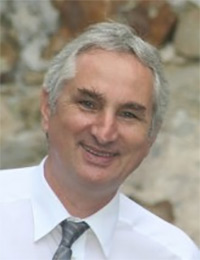 |
Ulrich Bartosch has been Professor of Pedagogy at the Faculty of Social Work, Catholic University of Eichstätt-Ingolstadt since 2000 and since 2009 he has chaired the Federation of German Scientists [Vereinigung Deutscher Wissenschaftler,VDW]. After a degree in Education (Regensburg 1986) and an MA in political science (Regensburg 1988), he obtained a PhD in political science from the Johann-Wolfgang-Goethe University, Frankfurt am Main, under the supervision of Prof. Dr. Iring Fetscher (Goethe University) and Prof. Dr. Herfried Münkler (Humboldt University, Berlin) with a dissertation on Carl Friedrich von Weizsäcker. He was a research associate at the Universities of Regensburg and Passau and was manager of the Department of Professional Preparation at the Vocational Training Centre of St. Franziskus, Abensberg (a social company working with handicapped young people).
In 1999 he became deputy manager of the Volkshochschule (Vocational Centre) in Hagen, where he headed the Department of Political Education. He was a visiting professor, University of Applied Studies in Kiel (2013), a visiting lecturer at Leuphana University, Lüneburg (2010–2013) and at Passau University (2014), a member of the management board of the Fachbereichstag Soziale Arbeit in Germany (2004–2010) and its chair from 2006 to 2010, and a member of the National Team of Bologna Experts of the German Academic Exchange Service [Deutscher Akademischer Austauschdienst; DAAD] in Germany. He is an expert of AVEPRO (Agenzia della Santa Sede per la Valutazione e la Promozione della Qualità delle Università e Facoltà Ecclesiastiche) in Rome (2012–2017).
Among his major publications are: Weltinnenpolitik. Zur Theorie des Friedens von Carl Friedrich von Weizsäcker [World Domestic Policy. On Carl Friedrich von Weizsäcker’s theory of peace] (Berlin: Duncker & Humblot, 1995). Besides working on pedagogy, e.g. on education for democracy with children and social school work, he continues to write on Weltinnenpolitik. Among his English publications are: “The abuse of power—pedagogy as oppression”, in: Ulrich Bartosch/Agnieskia Kulma (Eds.): Gewalt in der Gesellschaft—Ansätze und Handlungsmöglichkeiten der Sozialen Arbeit (Eichstätt; Fak. Soziale Arbeit 2013): 13–30; “Bringing transparency to the faculties? The Qualifications Frameworks in Action”, in: HRK (Ed.): Educating for a Global World. Reforming German Universities toward the European Higher Education Area (Bonn: HRK, 2008): 18f.; “Weltinnenpolitik—World Domestic Politics”, in: Global Marshall Plan Initiative (Ed.): Towards a World in Balance, A Virtual Congress for a Better Balanced World (Hamburg: Global Marshall Plan Initiative, 2006): 153–155; and in German: “Weltinnenpolitik als Weg zum Ewigen Frieden? Carl Friedrich von Weizsäckers idealistischer Realismus als Theorie einer nachhaltigen Politik”, in: Klaus Henschel/Dieter Hoffmann (Eds.): Carl Friedrich von Weizsäckers: Physik—Philosophie—Friedensforschung, Acta Leopoldina No. 63 (Stuttgart: Wissenschaftliche Verlagsgesellschaft Stuttgart, 2014): 323–342; with Reiner Braun (Eds.): Perspektiven und Begegnungen—Carl Friedrich von Weizsäcker zum 100. Geburtstag (Berlin: Lit, 2012); “Die zweifach beweinte Zukunft—Günther Anders unter aktuellen Vorzeichen wieder gelesen”, in: Harald Bluhm, Karsten Fischer, Marcus Lianque (Eds.): Ideenpolitik. Geschichtliche Konstellationen und gegenwärtige Konflikte. Festschrift für Herfried Münkler (Berlin: Akademie Verlag, 2011): 529–543; with Gerd Litfin, Reiner Braun, Götz Neuneck (Eds.): Verantwortung von Wissenschaft und Forschung in einer globalisierten Welt. Forschen—Erkennen—Handeln (Berlin: Lit, 2011); with Klaudius Gansczyk (Eds.): Weltinnenpolitik für das 21. Jahrhundert, Carl Friedrich von Weizsäcker verpflichtet (Berlin: Lit, 2009 3rd edition).
Website: <http://www.ku-eichstaett.de/swf/lehrpersonal/hauptamtliche/bartosch/> and <http://www. ulrich-bartosch.de/>. |
| |
|
Prof. Dr. Michael Drieschner |
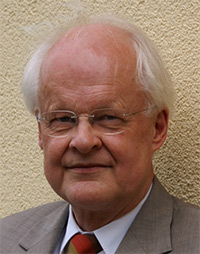 |
Michael Drieschner (born 1939) is a professor em. of Philosophy of Nature at the University of Bochum, Germany. After passing the ‘Diplom’ exam in physics (Munich 1964) he obtained his PhD in philosophy at the University of Hamburg in 1968 in the research group of Carl Friedrich von Weizsäcker with a work on the axiomatic structure of quantum mechanics. From 1970 to 1978 he was a researcher at the ‘Max-Planck-Institute for Research on the Conditions of Life in the Scientific-Technological World’ in Starnberg, Germany, again collaborating with C. F. v. Weizsäcker. In 1979 he published his Voraussage – Wahrscheinlichkeit – Objekt (Heidelberg 1979), a treatise on the foundations of quantum mechanics. From 1986 to 2006 he taught ‘Naturphilosophie’ (philosophy of nature) at the University of Bochum.
Further books are (Titles translated into English): Introduction to the Philosophy of Nature (Darmstadt: 1981/91); Carl Friedrich von Weizsäcker—an Introduction (Hamburg 1992); Modern Philosophy of Nature (Paderborn 2002). With L. Castell and C. F. v. Weizsäcker he was a co-editor of the first two volumes of: Quantum Theory and the Structures of Time and Space (Munich: Hanser, 1975 and 1977); he edited the collected works of C. F. v. Weizsäcker on CD-ROM (Berlin 2011). His papers on physical themes in English language are: “Lattice Theory, Groups, and Space”, in: L. Castell, M. Drieschner, C. F. v. Weizsäcker (Eds.): Quantum Theory and the Structures of Time and Space (Munich: Hanser, 1975): 55–69; “Is (Quantum) Logic Empirical?”, in: Journ. Philos. Logic, 6 (1977): 415–423; “The Abstract Concept of Physical Object”, in: L. Castell, M. Drieschner, C. F. v. Weizsäcker (Eds.): Quantum Theory and the Structures of Time and Space 2 (Munich: Hanser, 1977): 20–31; “The Subject Matter of Quantum Mechanics”, in: International Journal of Theoretical Physics, 31 (1992): 1615–1625; “The Lattice of Quantum Predictions”, in: International Journal of Theoretical Physics, 32 (1993): 1853–1861; “Symmetry and Composition – a Key to the Structure of Physical Logic?”, in: International Journal for Theoretical Physics, 37 (1998): 427–733; “Reality, Viewed from Quantum Mechanics”, in: H.D. Doebner et al. (eds.): Trends in Quantum Mechanics. (Singapore: World Scientific, 2000): 86–95; (with Tim Oliver Eynck und Holger Lyre): “Comment on Redhead: The Interpretation of Gauge Symmetry”, in: Kuhlmann M.; Lyre, H.; Wayne, A. (eds.): Ontological Aspects of Quantum Field Theory (Singapore: World Scientific, 2002): 303–312; “Is Time Directed?”, in: Albeverio, Sergio; Blanchard, Philippe (eds.): Direction of Time (Heidelberg-New York etc.: Springer, 2014): 117–135.
Home page: <http://www.ruhr-uni-bochum.de/philosophy/staff/drieschner>. |
| |
|
|
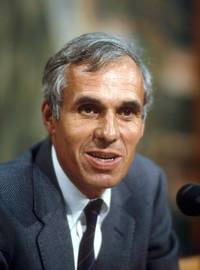 |
Prof. Dr. Konrad Raiser (born 1938 in Magdeburg, Germany) is a former General Secretary of the World Council of Churches (WCC) and Professor (em.) for Systematic Theology and Ecumenics at the Ruhr University Bochum. He studied Protestant theology in Tübingen, Heidelberg and Zürich from 1957-63 and sociology and social psychology at Harvard University, Cambridge, Massachusetts (USA) in 1965/66. From 1967-69, he was assistant in Practical Theology at the Protestant Theological Faculty in Tübingen (Germany). He earned a doctorate in theology in 1970 from the same faculty in Tübingen. In 1969, he joined the staff of the World Council of Churches in Geneva (Switzerland), first in the Commission on Faith and Order and then as Deputy General Secretary and Staff Moderator of the Unit on Justice and Service. From October 1983 to February 1993, he was Professor of Systematic Theology and Ecumenics at the Protestant Theological Faculty of the University of the Ruhr in Bochum (Germany). He assumed leadership of the WCC as General Secretary in January 1993 and retired from this office in December 2003. Since 2004 he lives in retirement in Berlin, Germany. His wife Elisabeth is the daughter of Carl Friedrich von Weizsäcker. They have four sons.
Konrad Raiser is the author of nine books (Identität und Sozialität, 1971, Ecumenism in Transition, 1991, Wir stehen noch am Anfang, 1994, To Be the Church, 1997, For a Culture of Life, 2002, Hoffen auf Gerechtigkeit und Versöhnung, 2002, and Schritte auf dem Weg der Ökumene, 2005, Religion-Macht-Politik 2010 (engl. Religion- Power-Politics, 2013), Ökumene unterwegs zwischen Kirche und Welt, 2013. In addition, he edited five other books. Since 1970 he has published numerous articles and essays on theological and ecumenical subjects, including four entries in the Dictionary of the Ecumenical Movement (WCC Publications, 1991), for which he was also a member of the editorial board. He was co-editor of two quarterly journals: Ökumenische Rundschau, and The Ecumenical Review. He holds honorary doctorates from the Budapest Theological Academy (1992), the University of Geneva (1996), and the University of Hamburg (2009). As guest lecturer he taught at the universities of Jena, Fribourg, Hannover, the Episcopal Divinity School and Harvard Divinity School in Cambridge/Mass., as well as the Lutheran Theological Seminary at Hongkong. |
| |
|
On the Institutions
Carl Friedrich von Weizsäcker Society |
| |
 |
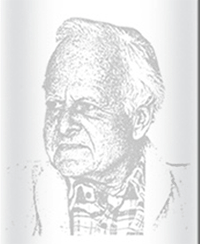 |
|
Modern science, especially the natural sciences, has given us the power of Greek gods. However, we would need the wisdom of Solomon to use this power sensibly. This is not something we have achieved, but rather it is a task facing us – possibly the single most important task of our time. In 1994, the Carl Friedrich von Weizsäcker Society had 18 founding members. Today, the Society’s activities include the organization of international symposia and the development of projects on the decisive challenges of our time.
Knowledge means Responsibility - Responsibility needs Knowledge
“Knowledge and Responsibility” is our programme in a nutshell. Inspired by the concerns and by the work of Carl Friedrich von Weizsäcker, the Society tries • to achieve an unbiased and rigorous analysis of our time in five working areas, and • to develop projects that particularly address the challenges and responsibilities of our time. “What must we do?” is first and foremost a question of insight; but it carries with it the task of furthering insights by gaining them a hearing and weight. Key programme tasks of the Carl Friedrich von Weizsäcker Society are therefore, for example, public conferences, expansion of membership, sponsors, partners and friends; but also to strive to develop in the longer term a “network of reason”.
Areas of Activities
Physics, philosophy, theology, economics and altered awareness are the areas of activity that will be addressed in our projects. Throughout his life as a scholar, Carl Friedrich von Weizsäcker has continued to address these areas. This is one motive for your choice. The second is the way they create our history and our future: nowadays all societies and cultures more or less depend on scientific and technical civilization, up to and including the solution of their economic and social problems. Still, physics may be considered as a “key science”, philosophy as a warning voice, “Do you know what you are saying, and do you know what you are doing?” Theology is the effort to understand what religious tradition can teach us for today and tomorrow, economics tries to understand social, environmental and political problems. Altered awareness, finally, the fifth area of activity, and which pervades all the others, explicitly or implicitly, systematically addresses questions of action and ethical stance in our time.
Address: Prof. Dr. Thomas Görnitz (chairman), Dr. Bruno Redeker (executive chairman), Carl Friedrich von Weizsäcker-Gesellschaft e. V., Bielefelder Straße 8, 32130 Enger, Germany
Website: <http://www.CFvW.de> and <http://www.CFvW.org/>
E-Mail: <wuv@cfvw.de> |
| |
|
Carl Friedrich von Weizsäcker Foundation |
| |
 |
 |
|
Modern science, especially the natural sciences, has given us the power of Greek gods. However, we would need the wisdom of Solomon to use the power sensibly. This is not something we have achieved, but rather it is a task facing us – possibly the single most important task of our time. The activities of the Carl Friedrich von Weizsäcker Foundation, established in 2002, focus on the organization of international symposia, on the preservation and publication of the scientific legacy of Carl Friedrich von Weizsäcker, and on the development of projects on the key challenges of our times.
The Central Guiding Questions
What should we know? What must we do? What may we hope for?
immediately bring to mind Kant’s “What can I know? What should I do? What may I hope for?” At the same time they imply a change of perspective towards reason jointly applied to the challenges of our time, the practical problems that humankind faces today:
- Science and technology model a world without borders,
- Innovations, technology and the market drive change in our time,
- The global population is growing and increasingly divided into ‘young’ and ‘old’ societies,
- The gap between poverty and wealth widens ever further: locally, regionally and globally,
- The potential for war and terrorism continues to grow, encompassing ethnically and culturally driven conflicts,
- Our use of resources is increasing, placing stress on the biosphere,
- Human power challenges the inherited constitution of nature,
- Overall political order is dominated more and more by the laws of the market,
- Democratic influence on political processes and decisions is waning,
- Ethical stances become relative in the bazaar of opinions.
In the eighth chapter of his book Der Mensch in seiner Geschichte [Humankind in its History] von Weizsäcker reflects on his adaptation of Kant’s questions under the heading “Where are we going?”: poverty and wealth, war and peace, human beings and nature, the problems are not resolved. But “with jointly applied reason they would be solvable”. This is what Carl Friedrich von Weizsäcker has argued for throughout his life as a scholar: not from the perspective of a developed theoretical system but with rationality following the example of everyday speech, “Be reasonable!” And “Our task for today is the global search for truth”. And “Reason means recognizing the necessary, and applied in common, to bringing into being what has been recognized as necessary.” If we fail to broaden and deepen our understanding of what lies at the core of the challenges of our time as far as we can, there is a constant danger that we might cause more harm than good. “Hope is the perception of the possible” wrote von Weizsäcker in answer to his third question, and at the end of his book he speaks of his hope in these words: “I have tried to speak about what I have experienced. Others may experience other things, more things. They will act.”
Address: Dr. Bruno Redeker (chairman), Carl Friedrich von Weizsäcker Stiftung, Bielefelder Straße 8, 32130 Enger, Germany
Website: <http://www.CFvW.de> and <http://www.CFvW.org/>
E-Mail: <stiftung@cfvw.de> |
| |
|
 |
| |
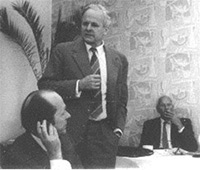
Founding members:
G. Burkhardt, C.F. v.
Weizsäcker. W. Gerlach |
Two years earlier this group of experts had become well-known to the public as ‘Göttinger 18’: Nuclear scientists who had publicly argued against a nuclear armament of the German Bundeswehr. Since then the FGS feels bound to the tradition of responsible science. It has nearly 400 members from different fields of the natural sciences, the humanities, and social sciences, so that a large range of topics is approached at a high level of competence. With the results of its interdisciplinary work the Federation of German Scientists not only addresses the general public, but also the decision-makers at all levels of politics and society.
The members of FGS stand in this tradition. They feel committed to taking into consideration the possible military, political, economic and social implications and possibilities of atomic misuse when carrying out their scientific research and teaching.
In Annual Conferences and in interdisciplinary Expert Groups as well as public comments it addresses issues of science and technology on the one hand, and peace and security policy on the other. At the same time, the role of science itself in genesis and in solution of socio-technological problems is subject of examination and expertise. FGS' membership lists also include representatives of the humanities and social sciences, so that a large range of topics is approached at a high level of competence. With the results of its interdisciplinary work the Federation of German Scientists not only addresses the general public, but also the decision-makers at all levels of politics and society. According to its statutes of 1959, the FGS aims to
- keep up and deepen the awareness of those working in science for their responsibility for the effects which their work has on society;
- study the problems which result from the continuous development of science and technology;
- assist science and its representatives in making public the questions related to the application of scientific and technical developments;
- provide advice and thus exercise influence on decisions as long as they are assessable and can be dealt with by means of scientific knowledge and methods, and to point out all forms of misuse of scientific and technical results;
- to defend the freedom of scientific research and the free exchange of its results and to expand and strengthen the traditional international cooperation of scientists.
Carl Friedrich von Weizsäcker had been part of the famous ‘Göttinger 18’, the group of renowned nuclear scientists who publicly opposed a possible nuclear armament of West Germany in the 1950s, and was among the founding members of the Federation of German Scientists in 1959. His spirit, his way of perceiving the world and his understanding of the role and responsibility of science for society and the development of humankind profoundly shaped the self-perception and sphere of influence of the FGS in its early years and later on. He also repeatedly served in public functions of the FGS, most notably as its chairman from 1969-1973.
Address: Vereinigung Deutscher Wissenschaftler (VDW), Marienstr. 19/20, 10117 Berlin, Germany;
Email: <info@vdw-ev.de>;
Website: <http://www.vdw-ev.de/index.php/de-DE/ >. |
| |
|
|
| |
|
Mission Statement
The name reflects the programme of action. The Foundation, set up by the Hamburg businessman Udo Keller, sees itself as a Forum Humanum – a forum for all those who would like to investigate the question of the truly human. At a time when technology and economic processes are increasingly influencing human choices, the Foundation addresses the importance of the moral and religious heritage of human cultures worldwide. The Foundation assumes that the future development of human beings will decisively depend on whether we succeed in harnessing the rich potential of these traditions for the future. In this way the Udo Keller Foundation argues for a revival of the question of the purpose of human life in twenty-first century terms.
Funding Priorities
The Udo Keller Foundation Forum Humanum contributes to an interdisciplinary dialogue between natural sciences and the humanities as well as to the multi-faith dialogue between world religions. These goals are being realized at its headquarters in Neversdorf near Hamburg and at its study centre in Tübingen, the FORUM SCIENTIARUM at the Eberhard Karls University of Tübingen.
Funding Activity
The Udo Keller Foundation Forum Humanum is a co-founder of the interdisciplinary project FORUM SCIENTIARUM at the Eberhard Karls University of Tübingen and is one of several inaugurators of the Academy of World Religions at the University of Hamburg. The Foundation has sponsored the Verlag der Weltreligionen (World Religions Press) since its establishment in 2007, and has initiated various lecture series in Hamburg and Tübingen – including Thinking the future (ZUKUNFT denken) in Hamburg in cooperation with the Hamburg Planetarium (2010–2014) and the Unseld Lectures at Tübingen (from 2008). Together with the German Literary Archives in Marbach, the Foundation has funded since 2008 the Udo Keller Scholarship for Contemporary Research into Religion and the Modern Age.
Additional information on the work of the Udo Keller Foundation Forum Humanum may be accessed in German on its website.
Address: Udo Keller Stiftung Forum Humanum, Kleine Seestr. 24, 23816 Neversdorf, Germany
Email: info@forum-humanum.org |
| |
|
|
| |
|
Portrait
Located in the midst of the dynamic, hospitable metropolitan area of the Ruhr, in the heart of Europe, the Ruhr-University Bochum (RUB) with its 20 faculties, RUB’s disciplinary institutional units, is home to 5,600 employees and over 41,000 students from 130 countries. All the great scientific disciplines are united on one compact campus.
The RUB is on its way to becoming one of the leading European universities of the 21st Century. Almost all courses are offered as Bachelor and Master degree programmes. Our excellence programmes have made themselves an international name: Our Research School is an international college for structured doctoral research in the life sciences, natural sciences, engineering, the humanities and social sciences. Interfaculty and interdisciplinary Research Departments, which are mutually, nationally and internationally networked, sharpen the profile of the RUB. Added to this is an unsurpassed programme for the promotion of Early Career Researchers, and an excellent infrastructure.
What makes it all come alive is the people who meet on campus with their thirst for knowledge, their curiosity, and their commitment. They help shape the RUB and their open-mindedness makes the RUB an attractive place for people from around the world.
Guiding principle of the RUB
The trio of values, people-centred – cosmopolitan – high-performance, represent the cornerstones of the RUB environment. This space is more than just the sum of its individual elements: People-centred and cosmopolitan means to respect diverse cultures and to give guests a home. People-centred and high-powered means jointly developing creative forces, to ‘tackle’ things with verve and ambition. ‘Campus RUB’ is the contemporary universitas – the community in which people take centre stage.
Living universitas
The members of the universitas teach others and, at the same time, learn from each other – whether in science, studies, engineering, or management. Universitas promotes and demands codetermination from everyone – a far cry from academic or hierarchical structures. Living universitas is: When students in the eTutoring project plan courses; when the promotional funding line of the research fund is judged solely by doctoral students; the uncomplicated interaction of researchers from various disciplines.
Address: Ruhr-Universität Bochum, Universitätsstraße 150, 44781 Bochum, Germany
Website: <http://www.ruhr-uni-bochum.de/universitaet/index_en.html>
Email: <international@rub.de> |
| |
|
|
| |
|
Although first established as the Catholic University of Eichstätt in April 1980, the CU continues an almost 450 year tradition of higher education. Our university is an academic community that seeks to impart knowledge and interpersonal skills while building on a foundation of Christian values. The CU has had the name “Catholic University of Eichstätt-Ingolstadt” since 2001 because in addition to the seven faculties in Eichstätt, the Ingolstadt School of Management was founded in 1989 on the oldest university site in Bavaria and, in the meantime, has become home to nearly every fourth student registered at the CU. Both CU locations consist of a campus with short walking distances. Crowded classrooms are unknown at the CU: seminars with fewer than twenty participants are not uncommon, and lectures are also no mass events. The approximately 4,500 students are advised by 120 professors, more than 200 associate instructors and lecturers, and numerous other experienced instructors.
In March 1980, the Apostolic See and the Free State of Bavaria as contract partners of the concordat agreed upon establishing the Catholic University of Eichstätt as a scientific college. Its supporter is an ecclesiastical foundation of public law, established by the bishops of Bavaria. Its name: "Stiftung Katholische Universität Eichstätt" (The Catholic University of Eichstätt Foundation).
The Eichstätt buildings of the KU were planned following the principle of a campus university - directly next to the old part of the town. And although the university has grown and spread now, distances remain short. The buildings of the Faculty of Business Administration are situated right next to a gate to the old part of Ingolstadt.
The Catholic university of Eichstätt-Ingolstadt is a college appropriate for family. Family friendliness or the compatibility of family and occupation / study should increase not only the competitiveness of the Eichstätter university as an employer and as a study place. Family friendliness also offers a relation to the Catholic Proprium of the KU and thus family friendliness beyond the theory in the everyday life would like to make KUEI for all students, scientific junior workers and employees practically experienceable.
Contact between university and economy is manifold - after all, it is part of the self-image of the KU to connect education with preparation for the labour market. Hence, the KU boasts a high rate of lecturers from economy and administration; in many disciplines, internship are obligatory. Companies profit by a direct transfer of knowledge from the college classroom to real-life situations.
Address: Katholische Universität Eichstätt-Ingolstadt, Ostenstraße 26, 85072 Eichstätt. Germany.
Website: <http://www.ku.de/en/unsere-ku/>
Email: <international@ku.de> |
 |
 |
|
|
|